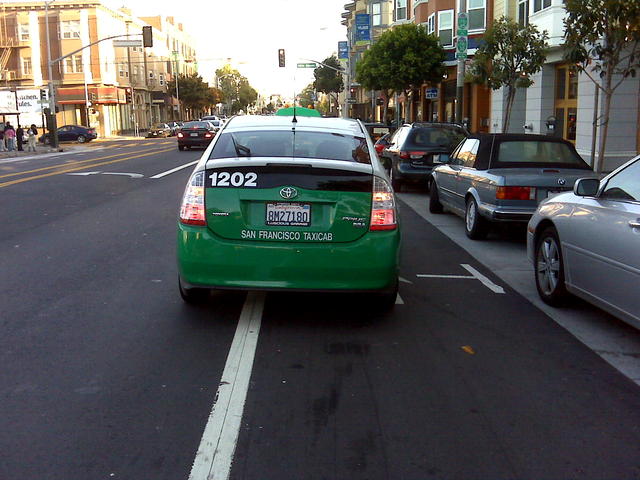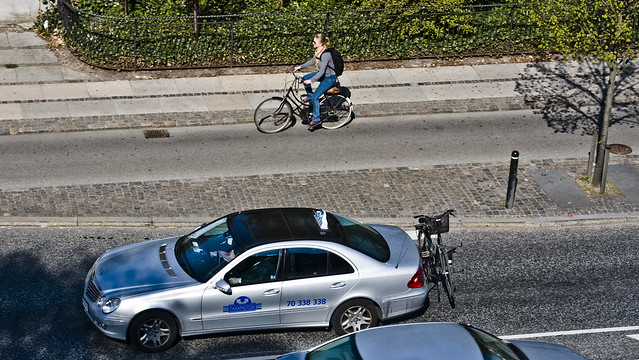The San Francisco Municipal Transportation Agency (SFMTA) is officially allowing taxi drivers to block bicycle lanes.
A memo [PDF] from Deputy Director of Taxi Services Christiane Hayashi and Accessible Services Manager Annette Williams says the agency is issuing bumper stickers to taxi drivers telling Parking Control Officers not to cite them.
John Han of Taxi Town SF first reported the story, writing that the move has been "more than a year in the making":
The memo, signed by Deputy Director of Taxis Services Christiane Hayashi, says not only will the SFMTA issue the bumper stickers, but it has also issued "guidance" to the Parking Control Officers instructing them not to ticket taxi drivers who are actively loading or unloading in bike lanes.
Taxis stopped in bike lanes routinely endanger people on bikes in San Francisco, and legitimizing the practice could encourage more of it. When blocked, bicycle riders are typically forced into passing motor traffic or between parked cars, where drivers or taxi passengers may open doors in their path.
Condoning such a dangerous practice seems incongruous with the SFMTA's goals of improving the safety of bicycling in the city.
Leah Shahum, executive director of the San Francisco Bicycle Coalition, said the organization "has real concerns about the agency's confusing policy regarding taxi pick-ups and drop-offs in bicycle lanes, which seems to invite conflict and unsafe conditions."
"In order to reach the city's official goal of 20 percent of trips by bicycle by 2020, we urge the SFMTA to develop a more coherent policy that prioritizes safe conditions for all road users, while also setting up more dedicated taxi stands for greater predictability," she said. "Increased use of both bicycles and taxis will help the city meet its transit-first goals and can be complimentary of each other."
The SFMTA's decision, according to the memo, comes from "the need to provide access to the curb for taxi and paratransit van customers with disabilities."
"The proliferation of new bicycle lanes throughout San Francisco has caused some confusion for taxi drivers and led, in some cases, to citations being issued while loading and unloading passengers in these bike lanes," the memo states.
"We work hard to find workable solutions to address safety concerns for all modes of transportation in our scarce right-of-way," said SFMTA spokesperson Paul Rose. "This plan allows for the safe use of bike lanes, while at the same time, providing curb access for paratransit van and taxi customers with disabilities."
Shahum said the SF Bicycle Coalition "is understanding of the SFMTA's imperative to provide access for taxi and paratransit van customers with disabilities," and that it "supports a flexible approach to assure full access for these road users as we build out the citywide bike network."
However, the decision seems to have been made without an opportunity for public input. Cheryl Brinkman, a member of the SFMTA Board of Directors, said she'd heard discussion about the needs of disabled passengers, but not of the wider policy change. Rose, the SFMTA's spokesperson, offered no comment on the public process.
The memo also includes a set of instructions for taxi drivers on how to "safely" stop in a bike lane, stressing the use of bike lanes as "an absolutely last resort" after looking "for other safe locations to stop (such as an open curb space, taxi stand, or side street)."
For physically separated bike lanes, like those on Market Street, the memo says taxis may only enter them to drop off "disabled or elderly customers who require direct access to the curb," and pick-ups are only allowed when the dispatcher tells a driver that "the customer is disabled and must be picked up at a location that is next to a separated bike lane."
Drivers are still forbidden from using them "for any other reason."
The SFBC, Shahum said, is encouraged by measures included in the memo to mitigate the increased danger to bicycle riders. Taxi driver training must now include a "defensive driving training module specific to driving safely around people on bicycles and bike lane policy."
The SFMTA will also issue decals "cautioning passengers to took for people on bicycles when exiting the vehicle to be affixed in the lower right hand corner of the rear window," according to the memo.
Alternative measures to help accommodate the needs of both bicyclists and disabled passengers could include converting more car parking into taxi stands.
New York, a city comparable to San Francisco, prohibits [PDF, pg. 52] motor vehicles from stopping in bike lanes at all.
Bike lanes can also be raised up near the level of the curb, allowing passengers to access the curb without conflicting with bicycle traffic. This practice can be seen in successful cycling cities like Copenhagen, Denmark, and similar features will be included in the coming redesign of San Francisco's Masonic Avenue.







